|
|
|
Sort Order |
|
|
|
Items / Page
|
|
|
|
|
|
|
| Srl | Item |
| 1 |
ID:
178353


|
|
|
|
|
| Summary/Abstract |
To date, marine genetic resources (MGR) have proven to be the most controversial aspect of the package deal structure of the ongoing negotiations of a legally binding instrument for the conservation and sustainable use of biodiversity beyond national jurisdiction (BBNJ). This has led to a proliferation of scholarly work characterizing the debate on MGR along developed and developing state lines. By applying middle power international relations theory to the Australian delegation’s conduct in MGR negotiations, this article aims to challenge the developed/developing state narrative. As such, it advocates a more nuanced approach to understanding state motivation in multilateral treaty negotiations pertaining especially to complex issues such as MGR.
|
|
|
|
|
|
|
|
|
|
|
|
|
|
|
|
| 2 |
ID:
145529
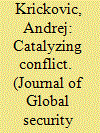

|
|
|
|
|
| Summary/Abstract |
Realists are accustomed to thinking about security competition between states in terms of the security dilemma: each state's efforts to improve its security can be taken as a threat by others, sparking competition that destabilizes the system and increases the likelihood of conflict. By focusing almost exclusively on external threat dynamics, however, common thinking about the security dilemma misses how domestic vulnerabilities can also be a catalyst for security competition. This is particularly the case in “weak” states that lack internal legitimacy. Weak developing states see intervention (whether perceived or real) targeted at their domestic vulnerabilities as an existential threat to political survival. When the targeted state responds to minimize or negate the threat, its response may be perceived as a threat, warranting a counter response. Particularly, when a targeted state possesses significant national power—as in the cases of China and Russia—a security competition is born. This article develops the logic behind this modified version of the security dilemma focused on internal vulnerabilities. Managing these internal fears will be of critical importance if we are to avoid the reemergence of security competition between great powers in the future.
|
|
|
|
|
|
|
|
|
|
|
|
|
|
|
|
| 3 |
ID:
112347
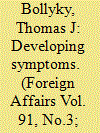

|
|
|
|
|
| Publication |
2012.
|
| Summary/Abstract |
The main health threat in developing states today is not plagues or parasites but illnesses such as cancer and diabetes, noncommunicable diseases long associated with the rich world. NCDs are striking poorer, younger populations, and this could debilitate states and the global economy. The best way for the West to help is by pushing for governance reform.
|
|
|
|
|
|
|
|
|
|
|
|
|
|
|
|
| 4 |
ID:
167981
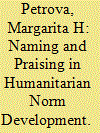

|
|
|
|
|
| Summary/Abstract |
To examine the early development of humanitarian norm cascades, the author focuses on the processes that led to the adoption of the 1997 Mine Ban Treaty and the 2008 Convention on Cluster Munitions. Even though major military powers like the United States, Russia, and China opposed these initiatives, the latter set in motion quick norm cascades that brought about international legal norms stigmatizing land mines and cluster munitions. It is conventionally asserted that international norms emerge either due to great power backing or despite great power opposition, but the author argues that new norms can also take off because of great power opposition. When ngos and leading states actively foster normative change, a particular type of norm cascade is engineered—one generated by different mechanisms and starting earlier than postulated in the literature. Early norm cascading is driven not by emulation of peers and ngo naming and shaming of laggard states, but rather by leadership aspirations and naming and praising.
|
|
|
|
|
|
|
|
|
|
|
|
|
|
|
|
| 5 |
ID:
087939
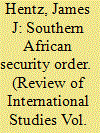

|
|
|
|
|
| Publication |
2009.
|
| Summary/Abstract |
Theories in international relations, predicated on particular assumptions, for explaining the relationship between regional economic integration and regional security miss the challenges to security in the developing world. Unlike the developed world, regional interdependence in much of the developing world engenders negative externalities. The relationship between regional economic integration and regional security depends on the nature of the security threats that define the region - traditional state vs state threats on one hand versus new security threats on the other hand. The nature of the security threat, or security dilemma, will determine how different forms of regional economic integration, laissez faire, functional, and developmental, define or re-define a particular regional security order. Building a 'security community' in the developing world, therefore, calls for new architectural principles. In the case of southern Africa, both, laissez faire (free trade area) and functional cooperation (spatial development initiatives) will foster insecurity rather than security.
|
|
|
|
|
|
|
|
|
|
|
|
|
|
|
|
| 6 |
ID:
087459
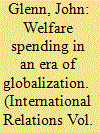

|
|
|
|
|
| Publication |
2009.
|
| Summary/Abstract |
This paper examines the assertion that economic globalization has led to the decline of welfare spending in recent decades. Although it is often argued that the increasing intensity of globalization has led to such a decline in the industrialized states, the paper finds that there has been little, if any, downturn in either levels of state expenditure in general or in levels of welfare spending in particular. However, the experience of the developing states has been rather different. In their case, the last few decades indicate that stagnation or a decline in welfare spending has occurred, particularly during the period of structural adjustment implementation. It is argued that the OECD countries still manage to provide a high level of social welfare to their populations that closely resembles the compensatory state model. In contradistinction, many of the states in the South have struggled to maintain their levels of social expenditure and therefore most resemble Cerny's competitive state model. In order to explain these two divergent outcomes, the paper examines the way in which the behaviour of certain key international financial actors (investors, multinational companies, international financial institutions) differs with regard to these two sets of countries.
|
|
|
|
|
|
|
|
|
|
|
|
|
|
|
|
|
|
|
|
|